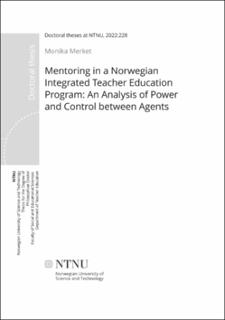| dc.description.abstract | Sammendrag
Veiledning i et norsk lektorutdanningsprogram:
En analyse av makt og kontroll mellom agenter
«[J]eg føler jeg lærer ekstremt mye mer i praksis enn jeg gjør på Campus …» Dette uttalte en av studentene som deltok i studien og viser betydningen praksis har i lærerutdanningen. Også i politikk og forskning har praksis fått økt interesse, hvor det beskrives at en styrket praksisopplæring vil øke kvaliteten på utdanningen og gjøre den mer effektiv. Dette har satt søkelys på veiledning av studentene i praksis og på møte mellom teoretisk og praktisk kunnskap. Dette er bakgrunnen for at jeg i avhandlingen har utforsket problemstillingen: «Hvordan forhandles kunnskap mellom agenter i veiledning i en norsk lektorutdanning?»
I lektorutdanningen består veiledning av studentene i praksis av veiledningssamtaler mellom veileder i skolen og student, og av praksisbesøk hvor en veileder fra universitetet også deltar i vurderingen av studenten. I avhandlingen har jeg forsket på hvordan kontroll- og maktrelasjoner mellom veiledere og student kommer til uttrykk i studentens veiledning. Basil Bernstein sitt teoretiske rammeverk er brukt som teori og metode, og datamaterialet er opptak av veiledningssamtaler og intervju med veiledere i skolen og studenter. Dette danner grunnlaget for tre artikler, hvor de to første handler om veiledningssamtalen og det siste om praksisbesøket.
Den første artikkelen handler om hvilke roller veilederen tar i veiledningssamtalen, og den andre om hva som diskuteres i samtalen og hvem som bestemmer hva som diskuteres. Funnene indikerer at veilederen bruker en aktiv, direkte og mangfoldig veilederrolle, og at en mangfoldig mentorrolle fremmer en mer aktiv studentrolle. Samtidig så viser funnene at det er veilederen som kontrollerer det som diskuteres i samtalen og at praktiske utfordringer i klasserommet er det som diskuteres mest og at faglige spørsmål diskuteres i mindre grad. Funnene i den tredje artikkelen indikerer at det er veilederne fra universitetet som i stor grad kontrollerer det som diskuteres i praksisbesøket og at studenten fremfører en forestilling for å få bestått vurdering.
Samlet viser funnene at veilederen har en sterk autonomi i veiledningen, men at det er intensiver i politikken som kan påvirke denne autonomien. Funnene peker derfor på viktigheten av å rette fokuset mot hvordan kunnskap forhandles i veiledning av studentene i praksis for å kunne forstå hva som ligger i en styrket praksisopplæring og en økt kvalitet i lærerutdanningen.
Summary
Mentoring in a Norwegian Integrated Teacher Education Program:
An Analysis of Power and Control between Agents
“[I] feel that I learn much, much more in practice than I do on campus …”. This quotation, from a student participating in this study, points out the importance of practice in teacher education. Indeed, practice is being given more attention in policy and research, where it is claimed that expanding and improving practice will increase the quality and effectiveness of teacher education. In this way, more attention is paid to mentoring the students in practice and to understanding the relation between theoretical and practical knowledge. From this frame of reference, I have explored the research question: “How is knowledge negotiated between agents in mentoring in an integrated teacher education program in Norway?”
In an integrated teacher education program, mentoring of the students in practice consists of mentoring dialogues between the school-based mentor and student, and assessment dialogues, where a university-based mentor also participates in the assessment of the students. In this thesis, I have explored relations of power and control between mentors and students in mentoring. To do so, Basil Bernstein’s theoretical framework has been used. The data material, consisting of recorded mentoring dialogues and interviews with school-based mentors and students, has been the source of three articles where two of them focus on the the mentoring dialogue and the third on the assessment dialogue.
The first article explores the roles the mentor assumes in the dialogues and the second article examines the content that is discussed and who decides what is to be discussed. The findings indicate that the mentors assume three roles in the dialogues: direct, active, and diverse mentor roles, where a more active student role is seen in relation to a diverse mentor role. At the same time, the mentors also control what is discussed in mentoring where this most often comprises practical issues and more rarely the academic subject. In the third article, where the assessment dialogue is examined, the findings indicate that the university-based mentors mainly control what is discussed, where the students put on an act to be awarded a passing grade.
All in all, the findings indicate that the school-based mentors have strong autonomy in mentoring. However, there are policy trends that could affect this autonomy. Consequently, the findings in this thesis point to the importance of focusing on how knowledge is negotiated in mentoring to better understand what strengthens practice and increases quality in teacher education. | en_US |

